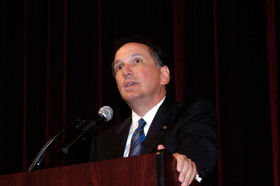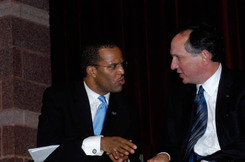 Remarks by
Remarks by
John C. Dugan
Comptroller of the Currency
Before the
Anacostia Economic Summit
Washington, D.C.
May 3, 2006
I want to thank John Bryant and Mayor Williams for the opportunity to join you today, and to discuss how we can all work together to expand our Nation’s prosperity to places like Anacostia.
There are partnerships on the ground here in Anacostia that are focused on the economic potential of this community – to ensure that that potential is recognized and realized. As a Washington, DC, native, I’m proud to see that Anacostia, long neglected and overlooked, is attracting renewed attention as a prime candidate for economic expansion by business, government, and nonprofits.
As businesses, investors, and its own residents understand the economic potential of Anacostia – its human capital and physical location among its many strengths – we are likely to see steady progress towards a healthy, vibrant community – full of opportunity. It is a recognition of both opportunities and challenges for places like Anacostia that sets the stage for today’s conference.
The civil rights movement — which took root here and in other disadvantaged communities of color — focused most of its energy on political empowerment. Today’s conference describes the current and future challenge as “silver rights,” because that challenge is all about economic empowerment — and about helping people to become true stakeholders in community development.
Like many of the speakers here today, I believe in the importance of residents holding a financial stake in the redevelopment of their communities as homeowners and small business owners. That kind of rebirth also happens to be very good for national
banks, because it nurtures a growing and economically prosperous customer base.
The OCC, which is part of the United States Department of the Treasury, has as its basic mission the supervision of national banks chartered by our agency. We oversee the activities of about 2,000 banks with assets of approximately 6 trillion dollars, representing about 70 percent of the nation’s banking assets.
Banks and other lenders have a responsibility to serve the credit needs of all of the communities in which they establish branches, including low- and moderate-income communities. This is the essence of the Community Reinvestment Act, or CRA, which was enacted in 1977 in response to concerns about “redlining” — the practice of discriminating against certain communities, typically lower-income and minority neighborhoods, by not lending or investing in those areas despite accepting deposits from them.

We’ve come a long way in the nearly thirty years since passage of the Community Reinvestment Act. At the OCC, our examiners track banks’ CRA performance and issue public reports that are posted on our website. And our Community Affairs Department takes our commitment to community development to the next level. We work with community-based organizations and governmental agencies operating in traditionally-underserved communities to help identify credit needs. And we work with banks to help develop strategies to meet those needs.
Make no mistake about it: Community-grounded organizations like Operation HOPE and the affiliates of NeighborWorks America are essential players in this process. These types of organizations provide practical ways for traditionally underserved communities to participate meaningfully in local economic development. Their homeownership and small business development counselors provide information that community residents can use to more effectively access the financial markets.
Here in Anacostia, the OCC has worked directly or indirectly with a variety of community development organizations, such as the Marshall Heights Community Development Organization, and Manna, Inc., which are the local affiliates of NeighborWorks America as well as the Hope Center. Organizations like these have helped facilitate a growing investment of capital into your neighborhoods, which I hope and believe is the broadly participatory neighborhood renewal of the future. They certainly seem part of the “silver rights” movement that you are honoring — and stimulating — at today’s Economic Summit.
Using national bank community development investment authority, we will continue to work with banks to identify opportunities for investments, loans, and services that will nurture community development in locales such as Anacostia. And we’re talking real money here: During the past decade banks have invested more than 15 billion dollars in such projects nationwide. We will continue to encourage such investments within the appropriate framework of responsible risk management.
Of course, investment of any kind is rarely without risk. In our experience, however, the odds of successfully investing in community development are dramatically increased when there are genuine community-based and community-accountable partnerships in place to drive investments from vision to reality, from blueprint to ribbon-cutting. This Economic Summit is a testimonial to the vibrant presence and potential of many such partnerships here in Anacostia.
Thank you for inviting me to share this day of promise and hope with you.
